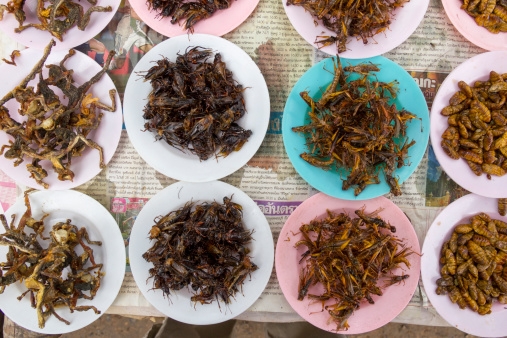https://beta.scmp.com/news/hong-kon...e-change-citys-bakers-told-switch-ingredients
On Tuesday, the Consumer Council said it had found traces of glycidol and acrylamide – chemical by-products of the manufacturing process that increase the risk of cancer – in almost 90 per cent of the 58 samples tested between August and October last year.
Meanwhile, 35 types of cookie were found to contain 3-MCPD, another chemical by-product that can harm the kidneys and male fertility.
My suggestion is to not to eat anything made by the Chinese. There is a 90% chance that it is contaminated with something that can be potentially lethal.
The Chinese will do anything to make a fast buck. They couldn't care less how dangerous their actions might be as long as it spells more profit. That's the nature of their species.
- HOME»
- NEWS»
- WORLD NEWS»
- ASIA»
- CHINA
Top 10 Chinese Food Scandals
The massive stockpile of melamine-tainted milk powder seized from Chinese warehouses is the latest in a long line of food scandals. Here are 10 others:
Police inspect illegal cooking oil, better known as "sewer oil" seized during a crackdown in Beijing Photo: AFP/GETTY IMAGES

By
Peter Foster, Beijing
11:00AM BST 27 Apr 2011
Melamine Milk scandal
In 2008 six babes were killed and 300,000 were left sickened after consuming infant formula contaminated with the industrial chemical melamine. The scandal, which was hushed up for several months to avoid embarrassment during the Olympic Games, caused outrage in
China and smashed public confidence in the government and its ability to regulate the food industry.
Toxic Bean-sprouts
Police in the northeastern city of Shenyang seized 40 tons of beans-prouts in April 2011. The tainted vegetables had been treated with sodium nitrite and urea, as well as antibiotics and a plant hormone called 6-benzyladenine. The chemicals were used to make them grow faster and look ‘shinier’ in the market stalls. 12 people were arrested.
Pesticide-drenched ‘yard-long’ beans
Related Articles
More than 3.5 tons of “yard-long” green beans contaminated with banned pesticide isocarbophos, were destroyed after being discovered on sale in the central city of Wuhan in March 2010. The beans had come from the southern city of Sanya, and allegations of another attempted cover-up followed after the Sanya agricultural law enforcement bureau said it was “inconsiderate” of Wuhan authorities to publicise the case.
Leather milk
In February 2011 reports emerged of another milk contamination scandal, this time using leather-hydrolyzed protein which, like melamine, appears to boost the protein-content of milk, thereby enhancing its value. The problem had been detected as early as March 2009 reported the official China Daily newspaper reported Friday. China announced this month it was closing almost half of its dairies in a bid to clean up the industry.
‘Aluminium’ dumplings
After reports that much of China’s rice crop was contaminated with heavy metals, health authorities in Shenzhen, southern China tested 696 samples of food made with flour, including dumplings and steamed buns. Nearly one third (28pc) were found to have levels of aluminium above national standards, the Shenzhen Standard reported. The contamination was blamed on excessive use of baking powder containing the metal.
Glow-in-the-dark pork
Reports and photographs surfaced last month showing pork that glowed an eerie, iridescent blue when the kitchen lights were turned off. Online users dubbed it “Avatar” meat and remained sceptical despite reassurances from the Shanghai Health Supervision Department which said the pork that has been contaminated by a phosphorescent bacteria and was still safe eat if well-cooked.
‘Lean meat powder’ pork
China has fought a long-running battle with the use of the steroid clenbuterol in pork production. Known as ‘lean meat powder’, it can cause dizziness, heart palpitations, diarrhoea and profuse sweating. The most recent case occurred last March in a stock market-listed pork producer, but China has acknowledged 18 outbreaks of food-related clenbuterol poisoning between 1998 and 2007, according to a report on the Shanghai Food Safety website.
Toxic take-away boxes
In April 2010 more than 7m toxic disposable food containers were seized in eastern province of Jiangxi. Although banned in 1999, the foam-boxes are still in widespread use in China, releasing toxic elements when warmed by food. The chemicals have the potential to damage livers, kidneys and reproductive organs.
‘Sewer’ oil
An undercover investigation by a professor from Wuhan Polytechnic University in March 2010 estimated that one in 10 of all meals in China were cooked using recycled oil, often scavenged from the drains beneath restaurants. The State Food and Drug Administration issued a nationwide emergency ordering an investigation into the scandal of the so-called ‘sewer’ oil, which further dented public confidence in the food industry.
‘Cadmium’ rice
Research published in February claimed that up to 10 per cent of rice sold in China was contaminated with heavy metals, including cadmium. Data collected by Nanjing Agricultural University found that the problem was most acute in Southern provinces, where in some areas 60 per cent of samples were contaminated, some with up to five times the legal limit.







